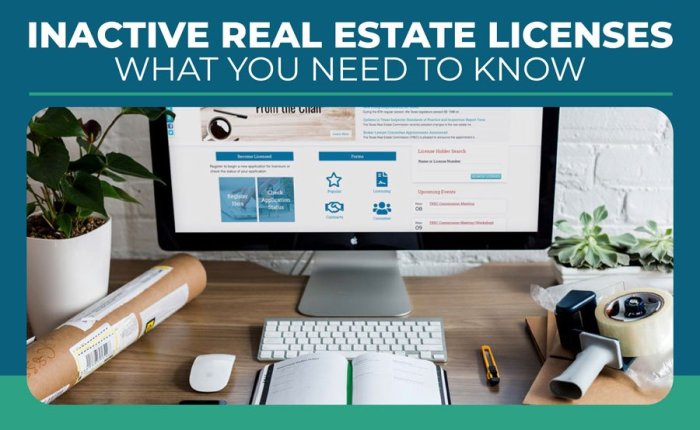Involuntary inactive real estate license refers to a situation where a real estate agent’s license is suspended or revoked due to specific circumstances or actions. This article delves into the concept of involuntary inactive licenses, exploring the causes, consequences, and steps involved in reactivating a license.
Understanding the implications of an involuntary inactive license is crucial for real estate professionals. It can significantly impact their career, financial stability, and reputation. This article provides comprehensive information to help agents navigate the complexities of involuntary inactive licenses and maintain their active status.
Involuntary Inactive Real Estate License

An involuntary inactive real estate license is a status assigned to a real estate agent’s license when the state regulatory agency responsible for licensing determines that the agent is not in compliance with state regulations or has engaged in misconduct.
Circumstances that can lead to an involuntary inactive license include:
- Failure to renew the license on time
- Violations of state real estate laws or regulations
- Complaints or investigations involving allegations of misconduct or unethical behavior
The potential consequences of having an involuntary inactive license include:
- Inability to practice real estate
- Loss of income
- Damage to reputation
Causes of Involuntary Inactive Real Estate License
Common reasons for an involuntary inactive real estate license include:
- Failure to complete continuing education requirements:Most states require real estate agents to complete a certain number of continuing education hours every year to maintain their license.
- Violations of the real estate code of ethics:Real estate agents are expected to adhere to a code of ethics that governs their conduct and business practices.
- Misrepresentation or fraud:Any act of misrepresentation or fraud in connection with a real estate transaction can lead to an involuntary inactive license.
- Commingling of funds:Real estate agents are required to keep their clients’ funds separate from their own.
- Unlicensed activity:Engaging in real estate activities without a valid license is a serious offense that can result in an involuntary inactive license.
Impact of Involuntary Inactive Real Estate License
An involuntary inactive license can have a significant impact on a real estate agent’s career:
- Loss of income:An agent with an inactive license cannot practice real estate, which means they cannot earn any income from real estate commissions.
- Damage to reputation:An involuntary inactive license can damage an agent’s reputation and make it difficult to find new clients.
- Legal liability:An agent with an inactive license who continues to practice real estate may be subject to legal liability.
Reactivating an Involuntary Inactive Real Estate License
The process for reactivating an involuntarily inactive real estate license varies from state to state. However, in general, the agent must:
- Complete any outstanding continuing education requirements.
- Pay any outstanding fees or fines.
- Submit a written request to the state regulatory agency.
- Attend a hearing or interview with the state regulatory agency.
Avoiding Involuntary Inactive Real Estate License
Real estate agents can avoid having their licenses become involuntarily inactive by:
- Complying with state regulations and ethical standards.
- Completing continuing education requirements on time.
- Maintaining a clean disciplinary record.
- Seeking legal advice if they have any questions about the real estate code of ethics or other state regulations.
Answers to Common Questions
What are the common causes of an involuntary inactive real estate license?
Failure to renew the license, disciplinary actions, criminal convictions, and failure to meet continuing education requirements are common reasons for involuntary inactive licenses.
What are the potential consequences of having an involuntary inactive license?
Agents with inactive licenses cannot legally practice real estate, which can lead to loss of income, reputational damage, and potential legal liabilities.
What steps are involved in reactivating an involuntary inactive real estate license?
The reactivation process may involve completing additional education, passing an exam, providing proof of compliance with regulations, and paying any outstanding fees or fines.


